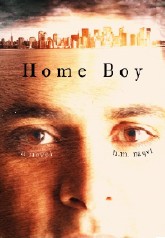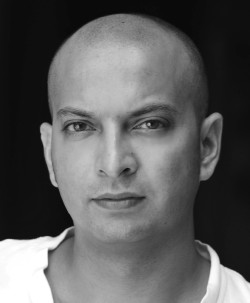Adil Najam
 I have been waiting many weeks to write about H.M. Naqvi’s debut novel, Homeboy.
I have been waiting many weeks to write about H.M. Naqvi’s debut novel, Homeboy.
I finished reading the book soon after it first came out this fall and found myself riveted to the richly layered, intense tale of three colorful characters – all of Pakistani descent – living in New York City. Homeboy follows the chaos brought into their once cavalier life by the events of 9/11.
I have waited this long to do a post on the book because I myself am not much of a fiction reader (I realize that this is a pity and my own loss). And this novel is not just a tale, but a work of literature that has been crafted with as much care and concern for craft of storytelling as for the story itself. It deserves a more thoughtful review than I could provide.
Such a review was just published in The New York Times:
Naqvi’s smart and sorrowful debut is at once immigrant narrative, bildungsroman and New York City novel, with a dash of the picaresque. Immigrant stories are often appealing not only because they dramatize the longing to trade oppression for freedom and prosperity, but also because they have the perfect antagonist: America itself.
Set in Manhattan just after Sept. 11, 2001, this novel follows three bright and likable college- age Pakistani men — AC, Jimbo and Chuck. Before 9/11, they fancy themselves “boulevardiers, raconteurs, renaissance men,†delighting in the self-invention that New York permits. After 9/11, everything changes. They abandon their “Metrostani†lifestyle to watch CNN all day, feeling “anxious and low and getting cabin fever.â€
Finally, they decide action is called for: “There was something heroic in persisting, carrying on.†They plan a road trip to find a mysterious Gatsby-esque friend (the novel is filled with allusions to Fitzgerald), and discover the same thing Gatsby did — there are limits to self-invention in America. Naqvi is a former slam poet, and his exuberant sentences burst with the rhythms and driving power of that form while steering clear of bombast.
“Home Boy†is a remarkably engaging novel that delights as it disturbs.
Other reviews have been equally glowing, but this one captures best what was also my own sense of the book. Especially in the review’s first line. It is a book that can be read at many levels, and is equally engaging – even frantically so – at each. It is very much an immigrant’s narrative and even more a very New York City narrative. But for Pakistani readers it is also a very Karachi narrative – look out, for example, for the deep and deeply affectionate descriptions of desi food, rendered lovingly with the passion of a Karachi connoisseur (for more on how a Lahori sensibility to food may differ, see elsewhere on ATP).
It is also a Pakistani-American narrative. That is the part that I can say something about.
For Pakistanis in America, H.M. Naqvi cuts close to the bone. The three key characters in the book are introduced very much as products of New York City. Immersed in, and at ease in, the city that has adopted so willingly them and which they have adopted so wholeheartedly. But as the story unfolds, the limits of that immersion and of their own ease with their adopted surroundings are tested. Those limits are tested not just for the characters but for the Pakistani-American reader.
For this Pakistani in America, at least, Homeboy explains how 9/11 has transformed the Pakistanis in America better than most analysts have been able to. The vast majority of Pakistanis in America will not be able to personally identify with all the antics of the three main characters nor with the tumult of their lives that 9/11 triggered – I did not – but most will immediately recognize the angst of entire lifestyles turned upside down by 9/11.
What struck me is how well Homeboy captures the ease with which Pakistanis in America before 9/11 could immerse themselves in their adopted society, how willing that society was of ‘outsiders’ (and no where more so than in New York City), and how much more comfortable a Pakistani immigrant could feel in America than just about anywhere else in the world. To me Homeboy is a story about how all of that changed after 9/11 in ways that have made Pakistanis in America as well as America itself more uncomfortable with themselves. To understand how the Pakistani community in America has changed after 9/11 we need to understand not just what things have been like since then (which is where pundits and analysts focus), but also on what things were like before that. Homeboy does both.
Let me end with a few more details on the book and its author, as published in USA Today:
What it’s about: Three young Muslim men, living a carefree life in Manhattan, experience suspicion, prejudice and incarceration after 9/11.
Why it’s noteworthy: A debut novel, it’s an authentic and honest portrayal of what it’s like to be a Muslim living in post-9/11 America.
Memorable line: “In prison, I finally got it. I understood that just as three black men were gangbangers, and three Jews a conspiracy, three Muslims had become what would be known as a ‘sleeper cell.’ “
Quick bio: Naqvi, 35, a citizen of Pakistan, was born in London (his father was a diplomat), raised in Algeria and Pakistan. Spent senior year of high school at St. Andrew’s Episcopal School in Bethesda, Md., “where I was the only brown man in the class.” Graduated from Georgetown University. Taught creative writing at Boston University. Lives in Karachi with his wife and 2-year-old son.
Fun fact: Naqvi represented Pakistan in National Poetry Slam in 1995. “One could make a case that the formal beginnings of my literary career were as a slam poet. I was quite taken by the then-smoke-filled clubs and people getting up and reading their stuff.”
Inspiration for the novel: Based in part on a slam poem Naqvi wrote after his brother was randomly visited by U.S. authorities post-9/11.
On being Muslim in America at that time: “You find yourself in the peculiar position that you are reeling from this great tragedy and then you are subsequently and consequently suspected of being somehow part and parcel of it.”
Most admired authors: Graham Greene, V.S. Naipaul, J.M. Coetzee. “These are three writers that I read again and again.”
On his fall reading list: Émigré Journeys by Abdullah Hussein. “He’s the greatest living writer of Urdu prose, and this was his first novel in English. It’s kind of exciting to read a novel by somebody who figured he’d write a novel in English in his 80s.”




















































Naqvi wrote a novel that was boring as hell. His book launches were monotone, and I was so not impressed. Plus he can try and shed some of his unnecessary attitude away
Home Boy is the best book that’s come out of South Asia in the last ten years. It doesn’t rely on the whole South Asian fiction thing. It’s fresh, new, it’s absolutely brilliant.
Bought it. Read it. Recommend it.
To A’ATP fan’, so you did not like the book and therefore everyone else must also not…. WOW. speaking of ‘arrogance’, that takes the cake!
While it is commendable that Mr. Najam is patronizing HM Naqvi’s book, he should have done his ATP readers better justice in this review and promo. Naqvi wrote a novel that was boring as hell. His book launches were monotone, and I was so not impressed. Plus he can try and shed some of his unnecessary attitude away (some may call it arrogance). I am all for promoting and encouraging talent from Pakistan, but will need to speak up when we unduly promote mediocrity. Lets hold off on the Boston promos for now… please.